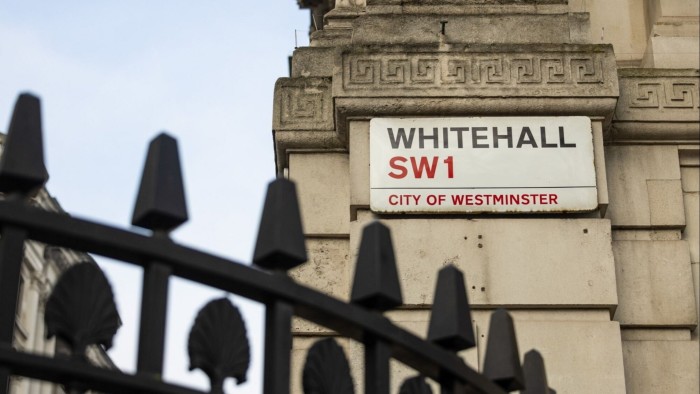Unlock the Editor’s Digest for free
Roula Khalaf, Editor of the FT, selects her favourite stories in this weekly newsletter.
A group of pro-growth Labour MPs is urging the UK government to raise the pay and number of political advisers, in a bid to attract more experts to Whitehall who can help ministers overhaul the state.
The Labour Growth Group (LGG), which boasts more than 100 parliamentarians, has co-written a report with Reform, the non-partisan Westminster think-tank, examining how Downing Street can improve the operations of central government, particularly the civil service.
Its recommendations seek to knock down a series of shibboleths that its authors believe are an unacceptable drag on officials’ performance — including risk-averse attitudes towards experimentation and an ingrained resistance to the incentive structures that are common in the private sector.
The report calls for each Whitehall department to be allocated a budget for politically appointed roles based on need, including the workload and complexity of expected reforms, as well as the political sensitivity of a department’s work and its legislative agenda.
“This should mean the appointment of significantly more, and more experienced, advisers,” the report said, adding: “There should be an immediate, significant uplift in the pay of special advisers, to enable ministers to attract experienced, expert and domain-specific advice.”
Currently special advisers’ pay starts at about £40,500. While a few at the top of the highest salary band can earn £145,000, many complain their pay is artificially suppressed out of concern to avoid criticism for a high “spad” payroll bill. This puts them far below what sector experts would command in equivalent private sector roles.
Only one in five appointees to senior civil service roles were recruited externally at present, the report said, as it recommended the creation of a new and highly competitive mid-career “fast stream” to usher in a new generation of talented leaders with private sector experience.
Officials should be allowed to trade less generous pension packages for higher pay in a bid to lure top talent from tech and beyond, and financial bonuses should be deployed at all levels of the civil service to incentivise innovation, it recommended.
It also suggested the appointment of special advisers to junior ministers, alongside greater use of non-executive directors and expert councils to provide support and constructive challenge.
One member of the caucus said it felt “instinctively wrong” to limit senior ministers with sprawling portfolios to just a handful of advisers, citing the example of Angela Rayner who has only six political aides to assist her in her roles as deputy prime minister, housing secretary and the cabinet minister overseeing the government’s sprawling devolution agenda.
Labour MP Chris Curtis, LGG co-chair, said that “getting Whitehall working to maximum capacity is an absolute priority” and argued that the “risk of keeping the status quo now significantly outweighs the risk of reform”.
Welcoming the upgraded UK growth forecasts unveiled at the Spring Statement last week, he warned: “The speed and scale of that growth depends on our ability to deliver ambitious changes via the British state.”
The report also recommended that government procurement processes should be rationalised, with a stronger emphasis on achieving best value for money for taxpayers, while the inclusion of “social value” criteria should be reviewed.
It exhorted ministers to exert a tighter grip of arm’s length bodies that operate outside direct departmental control, highlighting that these quangos now account for about 60 per cent of day-to-day spending, employ almost 400,000 people and manage some of the “most complex and high-risk” parts of the state.
Following Prime Minister Keir Starmer’s decision this month to abolish NHS England, which was the world’s largest quango and had more employees than the health department, the report suggested that more arm’s length bodies could be scrapped or merged to reduce duplication.
The teams within the Whitehall departments that oversee the bodies should also be expanded and empowered to monitor and drive up performance of them, it said.
The call comes in the wake of Simon Hoare, Conservative chair of the public administration and constitutional affairs committee, airing similar concerns about quangos last autumn.
The report applauded steps ministers were taking to bolster performance in central government, including a novel scheme to pay lacklustre officials to quit, and investment in artificial intelligence and digitisation that aims to deliver £45bn of savings and productivity improvements.
The report, entitled “rebuilding state capacity for economic growth”, has been submitted to Cabinet Office minister Pat McFadden’s team ahead of its publication on Monday and comes in the wake of Starmer’s vow to “rewire” the state.
One senior figure in the LGG said the caucus intended to act as an “organised and insurgent political force” to drive change in Whitehall, highlighting that while Downing Street has signalled that such reform is a priority, the same has “been the case in previous government — and it hasn’t happened”.




